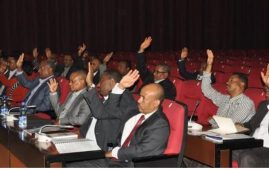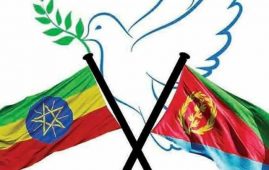The Egyptian State Information Service (as quoted on allAfrica.com) reported a statement by Dr. Mohammed Baha el Dien, Minister of Water and Irrigation of Egypt, on October 15th. The Minister is quoted as saying “Egypt does not stand in the way of any development project as long as it does not infringe on its rights to the Nile water”. There was a similar statement by the Minister on September 22nd when he said that “Egypt is still having concerns about the construction of Ethiopia’s dam due to its quantum storage capacity.” The Minister added that “the Ethiopian Foreign Ministry assured Egypt and Sudan that in case there was any impact on their water quota due to the dam other projects will be carried out to collect lost water and cover shortage.”
It is indeed disappointing that there seems to be no end to unhelpful Egyptian statements over the use of the Nile waters in general and the construction of the Grand Ethiopian Renaissance Dam in particular despite the improved and encouraging bilateral relations between Ethiopia and Egypt.
It should have been clear by now that the Nile basin countries have amicably adopted the principle of equitable utilization of the waters of the Nile. This principle has guided the cooperation process through the Nile Basin Initiative, the Cooperative Framework Agreement, Joint Multipurpose Projects and other matters. Furthermore, the Nile Cooperative Framework Agreement unequivocally establishes water security of the Nile for all riparian countries without exception.
It has long been crystal clear that no riparian state in the Nile Basin can claim a monopoly of the waters of the Nile. Neither Egypt nor any other riparian country in the Nile Basin can afford anymore to be guided by false assumptions that they have exclusive rights to the Nile waters. Nor can they allow themselves to be haunted by perception of fears that have no basis or even by any deliberate distortions. By any standards, and in every case, the rights of any and all riparian country cannot now be infringed. All of them have an inalienable right to equitable utilization of the waters of the Nile.
To take the current situation: Egypt and Sudan graciously accepted Ethiopia’s offer to establish an International Panel of Experts (IPoE) to help address the whole issue of downstream impact, if any, relating to the Grand Ethiopian Renaissance Dam. The IPoE, made up of six experts, two each from Egypt, Ethiopia and Sudan as well as another four independent international authorities is fully engaged in the task as defined in its agreed Terms of Reference.
In this context, the statements of the Minister, noted above, appear out of place as they seem to pre-empt or prejudge the work of the IPoE. In addition, they seem to be confusing, making it unclear whether to believe if Egypt’s interest is to fall back on the out-dated position of quotas or holding to the earlier idea of the status quo, or if it is committed to proceed with the IPoE track which has been amicably established by the three Eastern Nile states – Egypt, Ethiopia and Sudan.
It is indeed regrettable that such unfounded and misleading statements should be made by a senior official of the Egyptian Government. It should be made absolutely clear with regard to the so-called assurance given by the Ethiopian Ministry of Foreign Affairs, that no such assurance has been given. This is simply because any such comment is unnecessary, out of place and irrelevant in the context of the work of the IPoE. The work of the International Panel of Experts is proceeding with the seriousness of purpose that the mandate of the panel demands.
In this context, it should also be underlined that the construction of the Grand Ethiopian Renaissance Dam (GERD) is in full swing. Nobody should entertain any doubt about that. All studies show that the dam will benefit Sudan and Egypt as well as Ethiopia. Indeed, all three countries can benefit enormously from mutual understanding and cooperation on the common water resources of the Nile. There is in fact no justification for Egypt to feel concerned or fearful, and certainly not for it to engage in any deliberate distortions over issues involving the use of the Nile waters.
It behooves all parties to exercise extreme care to operate within the letter and spirit of Rule 8 of the Rules of Procedure of the IPoE, and refrain from making unwarranted pronouncements including that made by Minister Dr. Mohammed Baha el Dien, and quoted by Almasry Alyoum on October 22nd. This will certainly contribute to the successful conclusion of the work of the International Panel of Experts.
**********
* Originally published on MFA.gov.et – in Oct. 2012, titled
“Misguided fear or deliberate distortion in the Nile Basin again?”. Re-published here with a permission to do so.
Check the drop down menu for posts on related topics.





